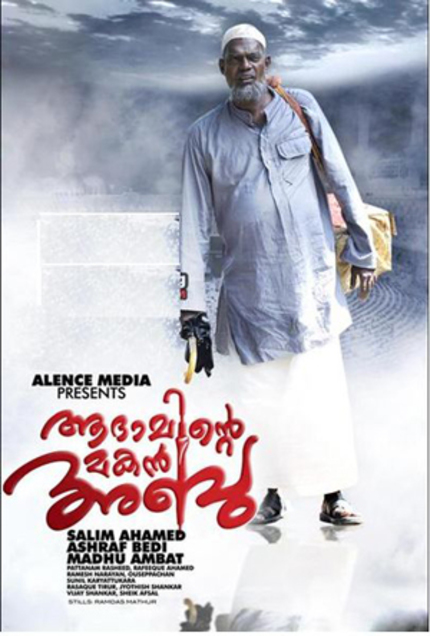SAIFF 2011: ABU, SON OF ADAM Review

Abu and his wife Aisu are a Muslim couple living in a rural village in Kerala. As they are getting older, Abu realizes that he is running out of good years during which to make the Hajj and visit The Holy Land, Aisu is an equally devout woman, and her desire to make the Hajj is also strong. These are not wealthy people, and the Koran only requests that those people who have the means to make this pilgrimage, but Abu and Aisu are determined to make their wish a reality. Abu sells holy texts at various mosques throughout the state, and Aisu sells her cow's milk to make ends meet. They are not wealthy people, but they are determined to make this journey before they die.
In an attempt to get the wheels moving, Abu requests a spot in the local Hajj group, organized by the locality to take residents to Saudi Arabia. However, after speaking with the local village headman, he is told that his best bet is to go to a friendly travel agency who will walk him through the process. Abu is not a man of the 21st century. Neither he nor his wife have passports, and they certainly don't have the 100,000+ rupees required to pay for the journey. This is where things begin to get sticky.
Abu's faith is constant, he believes that if Allah wants him to make the Hajj, that he will make it possible. In the meantime, he begins selling all he owns that has any value in order to pay for the trip. He begins with a jackfruit tree in his yard to a local lumber yard, then Aisu offers up her jewelery, then their cows, and on and on. Soon, they have their passports and they are beginning to plan and make their arrangements to leave.
In preparation, Abu and Aisu make the rounds of the people in their lives to bid them goodbye and forgive them any sins. This is one of the most heart-rending sequences of the film, as Abu begs forgiveness from everyone he knows, only to be told, without exception, that he is the purest heart among them. It shines through in the performance of Salim Kumar, who is never less than wholly sympathetic. Even for someone like me, whose opinion of organized religion is low, it is hard not to wish the best for Abu. He exudes such earnestness and goodness, that you want him to succeed, and you don't care how.
As is to be expected, the unexpected befalls Abu and Aisu and complicates their plans to make the Hajj. It soon becomes clear that everyone around Abu recognizes his devoutness and sincerity, and they all try to help. Christian, Hindu, and Muslim neighbors all seek to make Abu's dream come true, but it is the way in which Abu deals with this crisis that truly shows his mettle. In spite of everything he has to face; financial hardship, an ungrateful child in a faraway land, and the complexities of the modern world, Abu abides. It becomes clear that whether he makes the trip with his body, his mind is already at peace.
The film may feel like it presents an idyllic vision of India, but Kerala has a long history of this type of film. The state is among the most religiously diverse in all of India, and also one of the most well educated. Hindus, Muslims, and Christians live side by side in relative harmony. If there is a region of India that qualifies as idyllic, it may well be Kerala. Their film culture is built largely upon films like Abu, Son of Adam, films for whom realism is a more pressing concern than the fantastic elements of the other major film industries.
Abu, Son of Adam is India's official submission to the Academy Awards this year, and has made the short list, which not many Indian films manage. However, the film deserves it's place. While is isn't flashy or edited like an epileptic seizure on-screen, it is heartfelt and beautiful. The cinematography showcases the beauty of Kerala, and the beauty of the faces of its residents. This film is like a breath of fresh air and a reminder of the power that film can have to affect its viewers in a way that stays with them.
Abu, Son of Adam opens the South Asian International Film Festival on Wednesday, November 9th at 8 PM.

Do you feel this content is inappropriate or infringes upon your rights? Click here to report it, or see our DMCA policy.




 (1)-thumb-80x80-93563.jpg)

